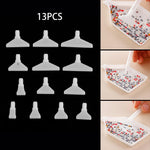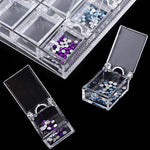Diamond painting has become a favorite hobby for many, offering a unique blend of creativity and relaxation. Sealing your diamond paintings is a crucial step to ensure they stay vibrant and intact for years to come. In this blog, we will explore the best techniques for sealing your diamond paintings, covering everything from the types of sealants to common mistakes to avoid. For high-quality diamond painting kits and supplies, be sure to visit our online store.
Why Sealing Your Diamond Paintings is Important
Diamond painting is a fun and relaxing hobby. The sparkling diamonds make beautiful pictures that you can be proud of. To keep your diamond paintings looking their best, it's important to seal them. Here's why:
- 1. Keeps Dust and Dirt Away
- 2. Stops Diamonds from Falling Off
- 3. Makes It Look Better
- 4. Makes It Last Longer
- 5. Gives You Peace of Mind
- 6. Easier to Frame and Display
Sealing your diamond painting is very important. It keeps them clean, prevents diamonds from falling off, makes them look better, helps them last longer, gives you peace of mind, and makes framing easier. By sealing your diamond paintings, you make sure they stay beautiful for years to come. So, take the time to seal your creations and enjoy their lasting beauty.
Different Types of Sealants
Sealing your diamond painting is important to keep it looking great and protect it from damage. There are different types of sealants you can use, each with its own benefits. Here’s a simple guide to help you choose the right one.
Brush-On Sealants
Brush-on sealants are liquids that you apply with a brush. They go on smoothly and cover all the diamonds, creating a protective layer.
Benefits:
-
Easy to Control: You can apply the sealant exactly where you want it.
-
Strong Bond: This type of sealant gets between the diamonds and holds them in place.
-
Glossy Finish: It often adds a shiny layer that makes your painting look even more beautiful.
Spray Sealants
Spray sealants come in aerosol cans and are sprayed directly onto your diamond painting. They are quick and easy to use.
Benefits:
-
Quick Application: You can cover large areas fast.
-
Even Coverage: It’s easy to get an even coat without brush marks.
-
Convenient: Ideal for those who prefer a no-mess option.
Adhesive Sealants
Adhesive sealants are special glues designed for diamond paintings. They are applied directly onto the diamonds to secure them in place.
Benefits:
-
Strong Hold: Provides a very strong bond, making sure the diamonds don’t move.
-
Glossy Finish: Often adds a nice shine to your painting.
-
Easy Application: Comes with an applicator for precise application.
Which Sealant Should You Choose?
The best sealant for your diamond painting depends on your preferences and the size of your painting. If you like precise control, a brush-on sealant is great. For quick and easy application, a spray sealant works well. If you want a very strong bond, an adhesive sealant is the best choice.
Sealing your diamond painting with the right type of sealant will keep it looking beautiful and lasting for years. Choose the one that fits your needs and enjoy the lasting beauty of your artwork!
Step-by-Step Guide to Sealing Your Diamond Painting
Sealing your diamond painting is an important step to protect it and keep it looking beautiful. Here’s a simple guide to help you seal your diamond painting perfectly.
What You Need
- 1. Your finished diamond painting
- 2. A clean, soft brush
- 3. Your chosen sealant (brush-on, spray, or adhesive)
- 4. A flat, clean workspace
Step 1: Prepare Your Painting
Before you start, make sure your diamond painting is clean. Use a soft, dry brush to gently remove any dust or dirt from the surface. This will help the sealant stick better and give a smoother finish.
Make sure you have everything you need ready to go. This includes your sealant, brush (if using a brush-on sealant), and any other tools you might need.
Step 2: Apply the Sealant
Applying sealant correctly is key to protecting your diamond painting. Choose your sealant type and follow the application instructions for the best results.
Using Brush-On Sealant
-
Dip the Brush: Dip a clean brush into the sealant. Make sure not to get too much sealant on the brush at once.
-
Apply the Sealant: Start at one corner of your painting and brush the sealant on in thin, even layers. Work in small sections to ensure you cover every part of the painting. Make sure to get between the diamonds for a strong hold.
-
Let It Dry: Let the first layer dry completely. Depending on the sealant, this might take a few hours. Once dry, you can add a second layer if you want extra protection.
Using Spray Sealant
Spray sealants are quick and easy to use. They provide even coverage and are perfect for larger paintings.
-
Shake the Can: Shake the can well to mix the sealant inside.
-
Spray Your Painting: Hold the spray can about 6-8 inches from your painting. Move the can back and forth in a sweeping motion to cover the whole surface evenly. Keep the can moving to prevent drips or thick spots.
-
Let It Dry: Allow the sealant to dry completely. This usually takes a few hours, but check the instructions on the can for the exact drying time. You can apply a second coat if needed.
Using Adhesive Sealant
Adhesive sealants are designed to secure diamonds firmly in place. They add a strong, protective layer to your artwork.
-
Apply the Sealant: Use the applicator to spread the adhesive sealant directly onto the diamonds. Make sure to cover all areas evenly and get the sealant between the diamonds to hold them in place.
-
Spread Evenly: Use a small brush or the applicator to spread the sealant evenly over the surface.
-
Let It Dry: Allow the adhesive sealant to dry thoroughly. This might take several hours or overnight, depending on the product.
Step 3: Final Touches
Once the sealant is completely dry, inspect your painting. Look for any spots you might have missed or areas that need a little more sealant.
- Add More Sealant if Needed:
If you find any missed spots, apply a bit more sealant and let it dry again.
Clean your brush (if you used one) and put away your supplies.
Step 4: Enjoy Your Sealed Painting
Your diamond painting is now sealed and protected! You can frame it, hang it on the wall, or give it as a gift. The sealant will keep your painting looking bright and beautiful for a long time.
Sealing your diamond painting is a simple process that helps protect your artwork and keeps it looking amazing. By following these steps, you can ensure your diamond painting stays vibrant and secure for years to come.
Common Mistakes to Avoid When Sealing Your Diamond Painting
There are some common mistakes people make that can affect the final result. Here are five mistakes to avoid:
Using Too Much Sealant
Applying too much sealant can create a thick, uneven layer that can cover up the diamonds and make your painting look less shiny.
Always apply a thin, even coat of sealant. It’s better to use several thin layers rather than one thick one. This ensures that each layer dries properly and looks smooth.
Not Letting the Sealant Dry Completely
If you don’t let each layer of sealant dry completely, the next layer won’t stick properly. This can make the surface sticky and attract dust and dirt.
Be patient and follow the drying times recommended by the sealant manufacturer. Make sure each layer is fully dry before adding another.
Choosing the Wrong Type of Sealant
Not all sealants are suitable for diamond paintings. Some can dull the sparkle of the diamonds or not provide a strong enough hold.
Choose a sealant specifically designed for diamond paintings. If you’re not sure which one to use, brush-on, spray, and adhesive sealants are all good options. Make sure to read the product description to ensure it’s suitable for diamond art.
Not Cleaning the Painting First
If your painting is dusty or dirty, the sealant won’t stick properly. This can create a rough surface and reduce the shine of the diamonds.
Before applying sealant, use a soft, dry brush to gently remove any dust or dirt from your painting. This will help the sealant adhere better and create a smooth, shiny finish.
Skipping the Edges
Forgetting to seal the edges of your diamond painting can leave parts of it unprotected. This can lead to diamonds falling off or the painting looking unfinished.
When applying sealant, make sure to cover the entire surface, including the edges. This ensures that all parts of the painting are protected and look great.
Avoiding these common mistakes can help you seal your diamond painting successfully. By using the right amount of sealant, letting it dry properly, choosing the right type, cleaning your painting first, and not skipping the edges, you can ensure your diamond painting art stays beautiful and protected for years to come.
Sealing your diamond paintings is a simple yet essential step to protect and preserve your artwork. By following the techniques outlined in this guide, you can ensure your diamond paintings remain vibrant and intact for years to come. We encourage you to share your sealing experiences and tips with our crafting community and explore more diamond painting guides on our blog.
Diamond painting has become a favorite hobby for many, offering a unique blend of creativity and relaxation. Sealing your diamond paintings is a crucial step to ensure they stay vibrant and intact for years to come. In this blog, we will explore the best techniques for sealing your diamond paintings, covering everything from the types of sealants to common mistakes to avoid. For high-quality diamond painting kits and supplies, be sure to visit our online store.
Why Sealing Your Diamond Paintings is Important
Diamond painting is a fun and relaxing hobby. The sparkling diamonds make beautiful pictures that you can be proud of. To keep your diamond paintings looking their best, it's important to seal them. Here's why:
- 1. Keeps Dust and Dirt Away
- 2. Stops Diamonds from Falling Off
- 3. Makes It Look Better
- 4. Makes It Last Longer
- 5. Gives You Peace of Mind
- 6. Easier to Frame and Display
Sealing your diamond painting is very important. It keeps them clean, prevents diamonds from falling off, makes them look better, helps them last longer, gives you peace of mind, and makes framing easier. By sealing your diamond paintings, you make sure they stay beautiful for years to come. So, take the time to seal your creations and enjoy their lasting beauty.
Different Types of Sealants
Sealing your diamond painting is important to keep it looking great and protect it from damage. There are different types of sealants you can use, each with its own benefits. Here’s a simple guide to help you choose the right one.
Brush-On Sealants
Brush-on sealants are liquids that you apply with a brush. They go on smoothly and cover all the diamonds, creating a protective layer.
Benefits:
-
Easy to Control: You can apply the sealant exactly where you want it.
-
Strong Bond: This type of sealant gets between the diamonds and holds them in place.
-
Glossy Finish: It often adds a shiny layer that makes your painting look even more beautiful.
Spray Sealants
Spray sealants come in aerosol cans and are sprayed directly onto your diamond painting. They are quick and easy to use.
Benefits:
-
Quick Application: You can cover large areas fast.
-
Even Coverage: It’s easy to get an even coat without brush marks.
-
Convenient: Ideal for those who prefer a no-mess option.
Adhesive Sealants
Adhesive sealants are special glues designed for diamond paintings. They are applied directly onto the diamonds to secure them in place.
Benefits:
-
Strong Hold: Provides a very strong bond, making sure the diamonds don’t move.
-
Glossy Finish: Often adds a nice shine to your painting.
-
Easy Application: Comes with an applicator for precise application.
Which Sealant Should You Choose?
The best sealant for your diamond painting depends on your preferences and the size of your painting. If you like precise control, a brush-on sealant is great. For quick and easy application, a spray sealant works well. If you want a very strong bond, an adhesive sealant is the best choice.
Sealing your diamond painting with the right type of sealant will keep it looking beautiful and lasting for years. Choose the one that fits your needs and enjoy the lasting beauty of your artwork!
Step-by-Step Guide to Sealing Your Diamond Painting
Sealing your diamond painting is an important step to protect it and keep it looking beautiful. Here’s a simple guide to help you seal your diamond painting perfectly.
What You Need
- 1. Your finished diamond painting
- 2. A clean, soft brush
- 3. Your chosen sealant (brush-on, spray, or adhesive)
- 4. A flat, clean workspace
Step 1: Prepare Your Painting
Before you start, make sure your diamond painting is clean. Use a soft, dry brush to gently remove any dust or dirt from the surface. This will help the sealant stick better and give a smoother finish.
Make sure you have everything you need ready to go. This includes your sealant, brush (if using a brush-on sealant), and any other tools you might need.
Step 2: Apply the Sealant
Applying sealant correctly is key to protecting your diamond painting. Choose your sealant type and follow the application instructions for the best results.
Using Brush-On Sealant
-
Dip the Brush: Dip a clean brush into the sealant. Make sure not to get too much sealant on the brush at once.
-
Apply the Sealant: Start at one corner of your painting and brush the sealant on in thin, even layers. Work in small sections to ensure you cover every part of the painting. Make sure to get between the diamonds for a strong hold.
-
Let It Dry: Let the first layer dry completely. Depending on the sealant, this might take a few hours. Once dry, you can add a second layer if you want extra protection.
Using Spray Sealant
Spray sealants are quick and easy to use. They provide even coverage and are perfect for larger paintings.
-
Shake the Can: Shake the can well to mix the sealant inside.
-
Spray Your Painting: Hold the spray can about 6-8 inches from your painting. Move the can back and forth in a sweeping motion to cover the whole surface evenly. Keep the can moving to prevent drips or thick spots.
-
Let It Dry: Allow the sealant to dry completely. This usually takes a few hours, but check the instructions on the can for the exact drying time. You can apply a second coat if needed.
Using Adhesive Sealant
Adhesive sealants are designed to secure diamonds firmly in place. They add a strong, protective layer to your artwork.
-
Apply the Sealant: Use the applicator to spread the adhesive sealant directly onto the diamonds. Make sure to cover all areas evenly and get the sealant between the diamonds to hold them in place.
-
Spread Evenly: Use a small brush or the applicator to spread the sealant evenly over the surface.
-
Let It Dry: Allow the adhesive sealant to dry thoroughly. This might take several hours or overnight, depending on the product.
Step 3: Final Touches
Once the sealant is completely dry, inspect your painting. Look for any spots you might have missed or areas that need a little more sealant.
- Add More Sealant if Needed:
If you find any missed spots, apply a bit more sealant and let it dry again.
Clean your brush (if you used one) and put away your supplies.
Step 4: Enjoy Your Sealed Painting
Your diamond painting is now sealed and protected! You can frame it, hang it on the wall, or give it as a gift. The sealant will keep your painting looking bright and beautiful for a long time.
Sealing your diamond painting is a simple process that helps protect your artwork and keeps it looking amazing. By following these steps, you can ensure your diamond painting stays vibrant and secure for years to come.
Common Mistakes to Avoid When Sealing Your Diamond Painting
There are some common mistakes people make that can affect the final result. Here are five mistakes to avoid:
Using Too Much Sealant
Applying too much sealant can create a thick, uneven layer that can cover up the diamonds and make your painting look less shiny.
Always apply a thin, even coat of sealant. It’s better to use several thin layers rather than one thick one. This ensures that each layer dries properly and looks smooth.
Not Letting the Sealant Dry Completely
If you don’t let each layer of sealant dry completely, the next layer won’t stick properly. This can make the surface sticky and attract dust and dirt.
Be patient and follow the drying times recommended by the sealant manufacturer. Make sure each layer is fully dry before adding another.
Choosing the Wrong Type of Sealant
Not all sealants are suitable for diamond paintings. Some can dull the sparkle of the diamonds or not provide a strong enough hold.
Choose a sealant specifically designed for diamond paintings. If you’re not sure which one to use, brush-on, spray, and adhesive sealants are all good options. Make sure to read the product description to ensure it’s suitable for diamond art.
Not Cleaning the Painting First
If your painting is dusty or dirty, the sealant won’t stick properly. This can create a rough surface and reduce the shine of the diamonds.
Before applying sealant, use a soft, dry brush to gently remove any dust or dirt from your painting. This will help the sealant adhere better and create a smooth, shiny finish.
Skipping the Edges
Forgetting to seal the edges of your diamond painting can leave parts of it unprotected. This can lead to diamonds falling off or the painting looking unfinished.
When applying sealant, make sure to cover the entire surface, including the edges. This ensures that all parts of the painting are protected and look great.
Avoiding these common mistakes can help you seal your diamond painting successfully. By using the right amount of sealant, letting it dry properly, choosing the right type, cleaning your painting first, and not skipping the edges, you can ensure your diamond painting art stays beautiful and protected for years to come.
Sealing your diamond paintings is a simple yet essential step to protect and preserve your artwork. By following the techniques outlined in this guide, you can ensure your diamond paintings remain vibrant and intact for years to come. We encourage you to share your sealing experiences and tips with our crafting community and explore more diamond painting guides on our blog.











